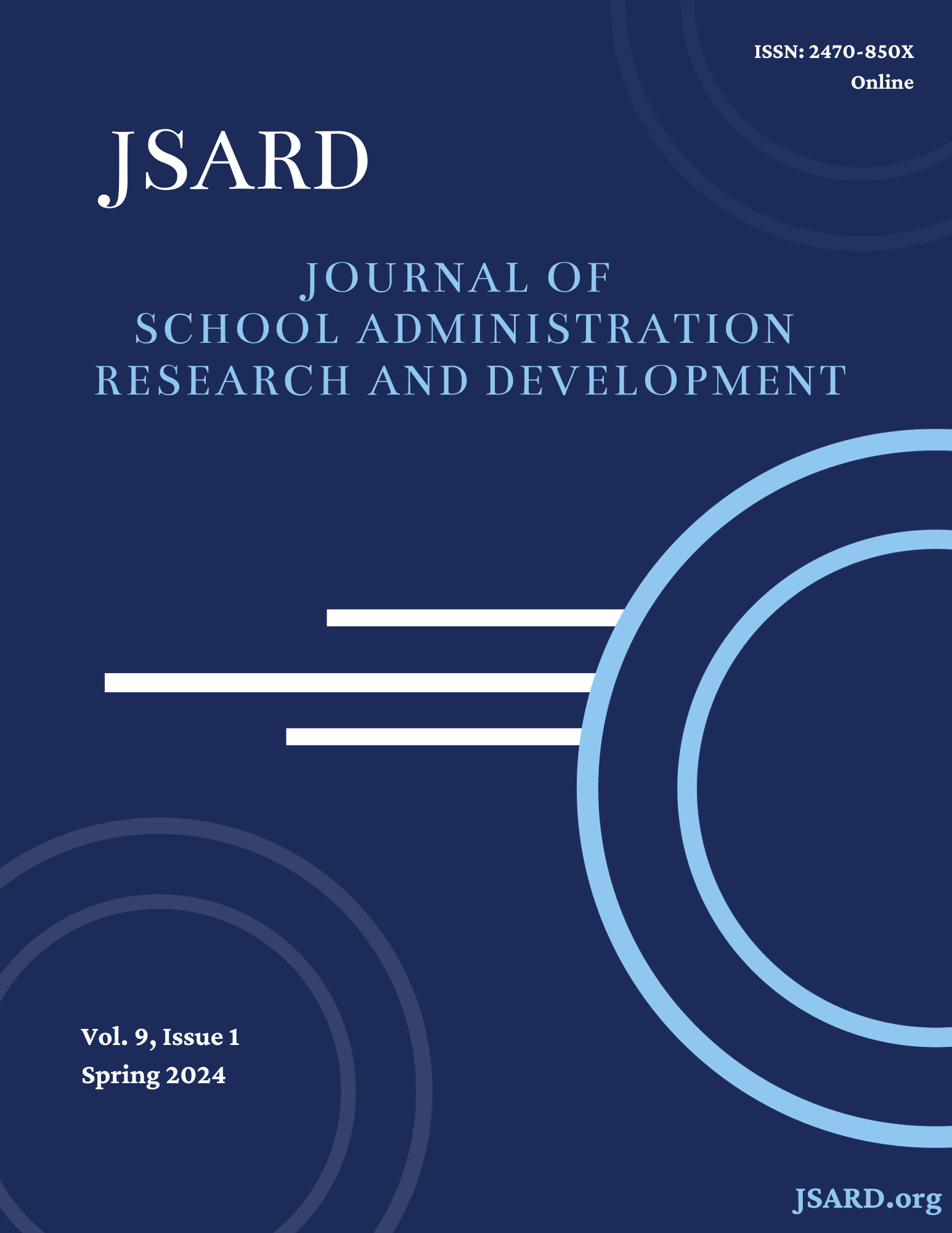A Discussion of Black Language Within the Context of Bilingual Pedagogy
Implications for Administrators
DOI:
https://doi.org/10.32674/jsard.v9i1.4824Keywords:
Bilingual education, Black language, translanguaging, culturally responsive pedagogyAbstract
The author examines some of the critical issues raised by Baker-Bell (2020a) about language education in the United States. The challenges associated with linguistic justice are related to a history of linguistic discrimination in the United States, which many sources have documented and affected many different linguistic backgrounds and peoples. This research inspired her to develop an antiracist Black language pedagogy that assists students in understanding their position in white linguistic hegemony. The author evaluates some of the ideas of Black language pedagogy, explicitly focusing on the requirements of administrators in K-12 education. Additionally, the author contrasts Baker-Bell’s ideas to translanguaging and how heteroglossic pedagogies are used to develop bilingual and bicultural students similar to the concepts of García (2009). The author then discusses how the ideas of heteroglossic language pedagogies, Black language pedagogy, and translanguaging could inform each other.
Downloads
References
Baker-Bell, A. (2020a). Linguistic justice: Black language, literacy, identity, and pedagogy. Routledge. DOI: https://doi.org/10.4324/9781315147383
Baker-Bell, A. (2020b). Dismantling anti-black linguistic racism in English language arts classrooms: Toward an anti-racist black language pedagogy. Theory into Practice, 59(1), 8–21. https://doi.org/10.1080/00405841.2019.1665415 DOI: https://doi.org/10.1080/00405841.2019.1665415
Baker-Bell, A., Paris, D., & Jackson, D. (2017). Learning Black language matters. International Review of Qualitative Research, 10(4), 360–377. https://doi.org/10.1525/irqr.2017.10.4.360 DOI: https://doi.org/10.1525/irqr.2017.10.4.360
Baker, C., & Wright, W. E. (2017). Foundations of bilingual education and bilingualism. Multilingual Matters. DOI: https://doi.org/10.1007/978-3-319-02258-1_2
Crawford, J. (1999). Bilingual education: History, politics, theory and practice (4th ed.). Bilingual Education Services.
Flores, N., & Rosa, J. (2015). Undoing appropriateness: Raciolinguistic ideologies and language diversity in education. In Harvard Educational Review; Summer, 85(2), 149-171. DOI: https://doi.org/10.17763/0017-8055.85.2.149
García, O. (2009). Bilingual education in the 21st century: A global perspective. Wiley-Blackwell.
García, O., & Otheguy, R. (2017). Interrogating the language gap of young bilingual and bidialectal students. International Multilingual Research Journal, 11(1), 52–65. https://doi.org/10.1080/19313152.2016.1258190 DOI: https://doi.org/10.1080/19313152.2016.1258190
Genesee, F., Lindholm-Leary, K. J., Saunders, W. M., & Christian, Donna. (2006). Conclusions and Future Directions. In F. Genesee, K. Lindholm-Leary, W. M. Saunders, & D. Christian (Eds.), Educating English language learners: A synthesis of research evidence (pp. 223–234). Cambridge University Press. DOI: https://doi.org/10.1017/CBO9780511499913
Hernández, A. M. (2022). Enacting asset-based approaches for critically conscious dual language teachers: The administrator’s role in a professional learning community. Journal of School Administration Research and Development, 7(1), 22–35. DOI: https://doi.org/10.32674/jsard.v7i1.2471
Hammond, Z. (2015). Culturally responsive teaching and the brain: Promoting authentic engagement and rigor among culturally and linguistically diverse students. Corwin.
hooks, bell. (1994). Teaching to transgress: Education as the practice of freedom. Routledge. DOI: https://doi.org/10.3366/para.1994.17.3.270
Kubota, R. (2019). A critical examination of common beliefs about language teaching: From research insights to professional engagement. In F. Fang & H. P. Widodo (Eds.), Critical perspectives on global Englishes in Asia: Language policy, curriculum, pedagogy, and assessment (pp. 10–26). Multilingual Matters. https://doi.org/10.21832/9781788924108-004 DOI: https://doi.org/10.21832/9781788924108-004
Ladson-Billings, G. (1992). Reading between the lines and beyond the pages: A culturally relevant approach to literacy teaching. Theory into Practice, 31(4), 312–320. https://doi.org/10.1145/2750858.2805824 DOI: https://doi.org/10.1080/00405849209543558
Lessow-Hurley, J. (2013). The foundations of dual language instruction (6th ed.). Pearson.
Lillie, K. E., & Moore, S. C. K. (2014). SEI in Arizona: Bastion for states’ rights. In S. C. K. Moore (Ed.), Language policy processes and consequences (pp. 1–27). Multilingual Matters. DOI: https://doi.org/10.21832/9781783091959-002
Lindholm-Leary, K. J. (2001). Summary and Conclusions. In N. Hornberger & C. Baker (Eds.), Dual language education (pp. 291–309). Multilingual Matters Ltd. DOI: https://doi.org/10.21832/9781853595332-016
McField, G. P., & McField, D. R. (2014). The consistent outcome of bilingual education programs: A meta-analysis of meta-analyses. In G. P. McField & D. R. McField (Eds.), The miseducation of English learners (pp. 267–297). Information Age Publishing. https://www.ebsco.com/terms-of-use
Pullum, G. K. (1999). African American Vernacular English is not standard English with mistakes. In Rebecca S. Wheeler (Ed.), The workings of language: From prescriptions to perspectives (pp. 39–58). Praeger.
Slavin, R. E., & Cheung, A. (2005). A Synthesis of Research on Language of Reading Instruction for English Language Learners. Review of Educational Research, 75(2), 247-284. DOI: https://doi.org/10.3102/00346543075002247
Wright, W. E. (2019). Foundations for teaching English language learners: Research, theory, policy, and practice. (3rd ed.). Caslon Publishing.
Downloads
Published
Issue
Section
License
Copyright (c) 2024 Journal of School Administration Research and Development

This work is licensed under a Creative Commons Attribution-NonCommercial-NoDerivatives 4.0 International License.
All published articles are licensed under a Creative Commons Attribution-NonCommercial-NoDerivs 4.0 Unported License.


.png)
